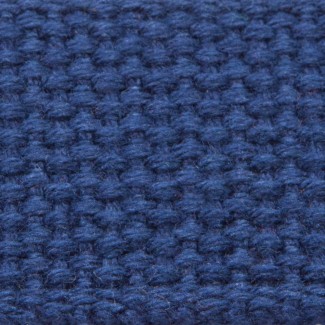Using Military-Grade Cotton Webbing for Military Helmets
 Military-grade webbing is a woven narrow fabric primarily designed for load bearing. It typically has a coarse weave and may have multiple plies. In UK military helmets, cotton webbing is used for the retention system, including the chinstrap, due to the melt hazard associated with synthetic-polymer fibers under extreme conditions. The webbing in military helmets, including chinstraps, is crucial for helmet security and, consequently, for protecting the brain from fragments and non-ballistic impacts. Rather than synthetic polymer fibers, cotton is used to avoid the risk of melting under extreme heat, which could pose a hazard to the wearer.
Military-grade webbing is a woven narrow fabric primarily designed for load bearing. It typically has a coarse weave and may have multiple plies. In UK military helmets, cotton webbing is used for the retention system, including the chinstrap, due to the melt hazard associated with synthetic-polymer fibers under extreme conditions. The webbing in military helmets, including chinstraps, is crucial for helmet security and, consequently, for protecting the brain from fragments and non-ballistic impacts. Rather than synthetic polymer fibers, cotton is used to avoid the risk of melting under extreme heat, which could pose a hazard to the wearer.
The challenges with military-grade webbing include its sensitivity to strain rates at quasi-static and dynamic rates and its degradation when exposed to ultraviolet radiation (UVR). Understanding how the webbing behaves under these conditions is critical, especially considering the environments where military operations occur. Exposure to UVR can weaken the webbing, affecting its dynamic tensile properties and potentially compromising the helmet's retention system.
Unique Qualities of Cotton Webbing for Military Applications
-
Melt Hazard Avoidance: Cotton's primary reason for being chosen over synthetic polymer fibers for UK military helmet webbing is its resistance to melting. In extreme heat conditions, synthetic materials can melt, potentially causing severe injuries to the wearer. Being a natural fiber, cotton does not pose such a melt hazard.
-
Load-Bearing Capacity: Despite its seemingly less advanced nature compared to synthetic fibers, cotton webbing has adequate strength for the specific application of helmet chin-straps. It provides the necessary load-bearing capacity to ensure helmet security and, by extension, wearer protection.
-
Degradation by UV Radiation: Although this might not seem like an advantage, the concern over cotton's degradation under UV exposure is a significant consideration. It implies an ongoing assessment of materials to ensure the best possible performance under various environmental conditions. Understanding how cotton degrades helps develop strategies for its maintenance or replacement, ensuring optimal performance.
Is Cotton the Best Material for All Military Gear?
While cotton webbing has its advantages for specific applications like helmet chin-straps, it is not necessarily the best material for all military gear. The selection of webbing material depends on several factors:
-
Application Requirements: Different military applications have varying requirements for strength, elasticity, environmental resistance, and safety. For instance, gear exposed to high temperatures might favor materials that resist melting, while applications requiring high tensile strength and durability might benefit from synthetic materials like nylon or polyester.
-
Environmental Exposure: Cotton's susceptibility to UV degradation might be a disadvantage in gear expected to endure prolonged exposure to sunlight. Synthetic fibers often offer better resistance to UV radiation and other environmental factors.
-
Strain Rate Sensitivity: Materials that maintain strength and elasticity under such conditions are crucial for applications where dynamic loading, such as parachutes or safety harnesses, might occur. The document mentions the performance of nylon and polyester under dynamic strain rates, suggesting that synthetic materials might be better suited for some applications.
While cotton webbing serves an essential role in specific military applications due to its resistance to melting and adequate load-bearing capacity, it is not universally the best material for all military gear. The choice of webbing material must be tailored to each application's specific requirements, environmental conditions, and safety considerations.
Related Reading
 Military-grade webbing is a woven narrow fabric primarily designed for load bearing. It typically has a coarse weave and may have multiple plies. In UK military helmets, cotton webbing is used for the retention system, including the chinstrap, due to the melt hazard associated with synthetic-polymer fibers under extreme conditions. The webbing in military helmets, including chinstraps, is crucial for helmet security and, consequently, for protecting the brain from fragments and non-ballistic impacts. Rather than synthetic polymer fibers, cotton is used to avoid the risk of melting under extreme heat, which could pose a hazard to the wearer.
Military-grade webbing is a woven narrow fabric primarily designed for load bearing. It typically has a coarse weave and may have multiple plies. In UK military helmets, cotton webbing is used for the retention system, including the chinstrap, due to the melt hazard associated with synthetic-polymer fibers under extreme conditions. The webbing in military helmets, including chinstraps, is crucial for helmet security and, consequently, for protecting the brain from fragments and non-ballistic impacts. Rather than synthetic polymer fibers, cotton is used to avoid the risk of melting under extreme heat, which could pose a hazard to the wearer.